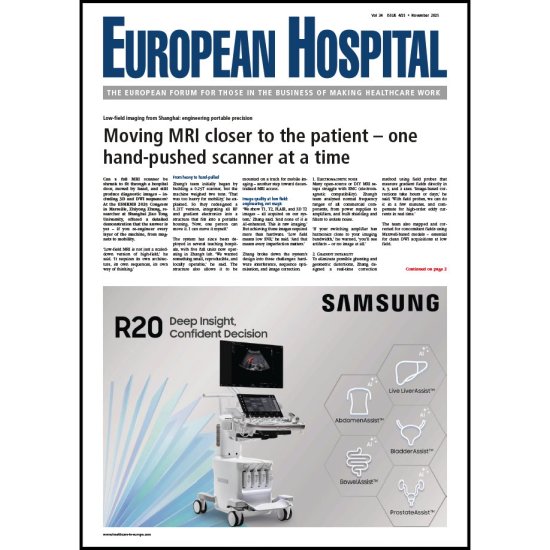
|
|
Female patients have distinctive needs for medical diagnostics and therapy, and thankfully, healthcare systems are catching up. New guidelines and research reflect the increased awareness of women's health, leading to better management of potential pregnancy complications and improved cancer screening. In this issue, we also take a look at recent breakthroughs in telemedicine, new insights into Covid-19, and more. Enjoy reading!
|
|
 |
Article • Emergency Department
Emergency care specialists must be aware of critically-important factors when treating pregnant women with severe hypertension. At the EUSEM conference in Barcelona, Dr Timo Suonsyrjä, Chief Physician for the Emergency Department at Helsinki ... |
News • Under-diagnosed condition
An AI-enabled digital stethoscope could help doctors identify twice as many cases of heart failure during pregnancy compared to regular obstetric care and screening, acording to a new study. |
|
News • Breast cancer screening
Mammography can lead to “false positives,” meaning they do not result in a breast cancer diagnosis. This may discourage some women from future screenings, according to a new study. |
|
News • COPD and asthma
Certain long-term health conditions such as chronic obstructive pulmonary disease (COPD) and asthma, can obscure early symptoms of lung cancer, leading to delays in diagnosis, a new study finds. |
|
News • Neuroblastoma diagnosis without anaesthesia
To diagnose neuroblastoma in children, lengthy scans and anaesthesia are often required. A new PET/CT imaging technique could deliver faster results without sedation for the paediatric patients. |
|
News • Circadian-based therapeutic strategies
The time of day can be an important aspect to consider for cancer therapy. Researchers from Charité are developing new methods to use the internal clock inside tumor cells to optimize treatments. |
|
News • Echocardiography
When the cardiologist cannot come to the patient, a robot arm might do the trick: New research shows the potential of echocardiograms performed remotely using robot arm technology and a 5G network. |
|
News • Remote procedure from Hongkong to Zurich
Breakthrough for telemedicine: Surpassing a distance of 9,300 kilometers, surgeons from Hongkong and Zurich successfully performed an endoscopic procedure in an animal model. |
|
News • Neurobiology
Acute kidney injury not only affects the kidneys, but can also impact brain health, leading to an increased risk for developing dementia. This is according to a new study from Sweden. |
|
News • Towards personalised risk assessment
With enough medical training data, AI can predict health conditions with astounding accuracy. Now, researchers want to use brain scans of the entire Scottish population to have an algorithm early detect dementia. |
|
News • Sars-CoV-2 research
Brazilian researchers have identified a key mechanism of Sars-CoV-2 to manipulate its host’s immune defense. This discovery could pave the way for the development of novel therapies. |
|
News • MCMV based approach
Protection from established Covid-19 vaccines wanes relatively quickly. A new vector vaccine elicits prolonged immune response in animal models, and maintains its efficacy over extended time. |
|
ePaper
|
Article • Information & insights
The latest issue of EUROPEAN HOSPITAL is here! We cover promising applications of mobile MRI, latest developments in breast cancer screening, strategies to protect healthcare institutions from cyberattacks, and more. Click here to read the ePaper. |
|
|
|
| |
You are receiving this email because you subscribed to our newsletter on healthcare-in-europe If you don’t want to receive this newsletter anymore, click here to unsubscribe.
Keep up-to-date on the latest news from all hospital-related fields!
Subscribe to our bi-monthly newsletter. Copyright © 2025 mgo fachverlage GmbH & Co. KG.
All rights reserved. E.-C.-Baumann-Straße 5, 95326 Kulmbach, Germany
email: newsletter@european-hospital.com |
|



|
|













